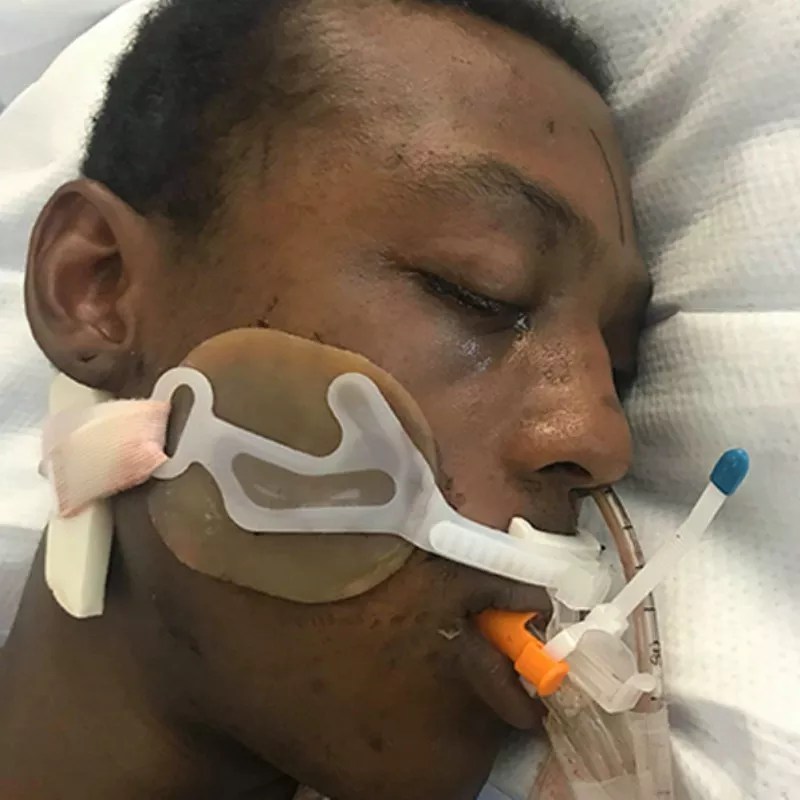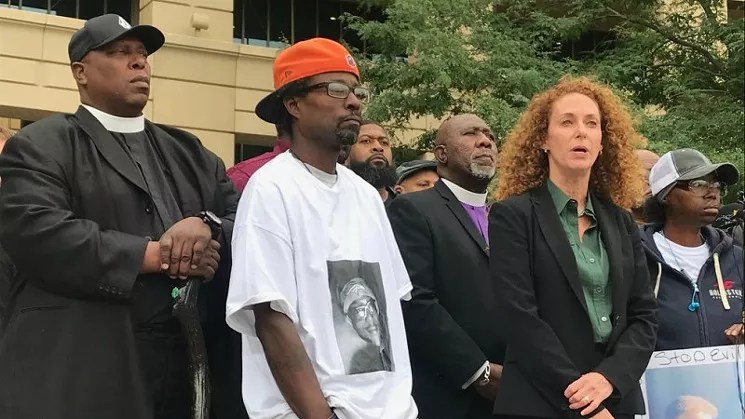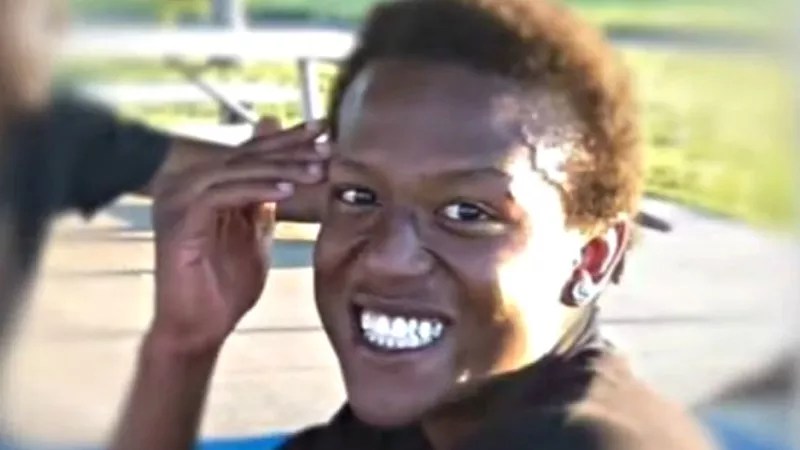
Family photo via the Aurora Sentinel

Audio By Carbonatix
Standard operating procedure for government agencies dictates that bad and/or controversial news be issued as late as possible on a Friday, when people already thinking about the weekend are likely to miss it. So it was no surprise that the Office of the Coroner for Adams and Broomfield counties chose just such a time on November 8 to announce that the official cause of death for 23-year-old massage therapist Elijah McClain, who suffered a fatal heart attack amid a shocking encounter with Aurora police officers on August 24, was “undetermined.”
According to Killmer, Lane & Newman LLP attorney Mari Newman, who represents McClain’s family, the fact that the autopsy report “was released quietly on a Friday afternoon gives you some indication how they want to go about this.” She adds that despite the inconclusive finding by forensic pathology consultant Dr. Stephen Cina, the other material in the document leaves “absolutely no doubt that if the Aurora police had not confronted Elijah the way they did, he would still be alive. He was tortured by these officers for a significant period of time, and there are injuries all over his body to prove it. The whole thing is incredibly sad.”
When asked for a comment about the autopsy, Officer Anthony Camacho, a spokesperson for the Aurora Police Department corresponding via email, refers the question to the coroner’s office, whose report represents its take on the incident. “The case is still active and ongoing,” Camacho adds. “As previously stated in a prior press release, once the report was completed, it would be included in the case that is then presented to the 17th Judicial District Attorney’s Office for review.”
The aforementioned release, put forward under the name of Aurora Police Chief Nick Metz, who’s announced that he’s retiring at year’s end, noted that he’d “ordered an investigation at the level consistent with officer-involved shootings pursuant to Senate Bill 15-219 by having a multi-agency team comprised of members from the Denver Police Department, Aurora Police Department and the 17th Judicial District Attorney’s Office” – the very agency that will determine whether criminal charges against the officers are justified.
Sue Lindsay, spokesperson for the 17th Judicial District, offered this answer to Westword‘s outreach on this topic: “We won’t be commenting on the autopsy and there is no update on the investigation at this time.”
The APD describes the episode like so: “On August 24, 2019 at 10:32 p.m. the Aurora Police Department received a 911 call where the caller described a ‘suspicious person.’ The caller reported an adult male was walking on Billings Street near East Colfax Avenue, wearing a ski mask and flailing his arms at the caller. Officers arrived in the area and contacted a male still wearing a ski mask, later identified as Elijah McClain. The male began to resist the officer contact, a struggle then ensued, and he was taken into custody. Aurora Fire Rescue administered a standard medication to reduce Mr. McClain’s agitation. He was then transported to a local hospital where tragically he died days later.”

Attorney Mari Newman spoke alongside Elijah McClain’s family members and representatives of the Greater Metro Denver Ministerial Alliance, among others, during an October 1 press conference at the Aurora Municipal Center.
Michael Roberts
The autopsy was conducted on September 3 by Cina with the assistance of Chief Coroner Monica Broncucia-Jordan, and the report reveals that “also in attendance were two representatives from Aurora PD and from the district attorney’s office” – something Newman sees as telling. “It certainly gave them the opportunity to color the findings,” she maintains.
The document “shows injuries over, really, almost all of Elijah’s body,” Newman points out. “His face was covered with abrasions, he had hemorrhaging in his neck, he had abrasions across his entire back, on his chest, on his shoulder, on his legs. So it’s very clear that the officers used force that impacted his entire body.”
In addition, she goes on, “Elijah had vomit in his lungs, which you expect considering what I saw in the video” – footage that has not yet been publicly released but is far from complete, since the body-worn cameras of the initial responding officers supposedly became dislodged and recorded mainly audio during the almost fifteen minutes the encounter lasted. “That asphyxiation was obviously caused by the police tackling him. That made him vomit, and then they pinned him down in his own vomit – and when he moved, one of the police officers said that if he did it again, he’d bring in the hounds to bite him.”
Along the way, McClain was injected with ketamine, a powerful drug commonly used prior to and during anesthesia. In his report’s opinion section, Cina notes the presence of marijuana in the victim’s system before stating that he could not exclude “an idiosyncratic drug reaction.” McClain was also placed in a chokehold – the report refers to the tactic as “a carotid control hold” – for an extended period of time. “I cannot determine whether a carotid control hold contributed to death via stimulation of the carotid sinus,” Cina acknowledges, but “the decedent was violently struggling with officers who were attempting to restrain him. Most likely the decedent’s physical exertion contributed to death. It is unclear if the officers’ actions contributed as well.”
Cina also suggests that McClain’s “agitated behavior and enhanced strength,” as well as his “sudden collapse after an intense struggle,” share commonalities with a state of “Excited Delirium” associated with mental illness. In his words, “It is thought that when adrenaline levels drop, potassium levels surge…. This mechanism may well explain his cardiac arrest.”
The report’s summary: “The manner of death may be accident if it was an idiosyncratic drug reaction. It may be natural if the decedent had an undiagnosed mental illness that led to Excited Delirium, if his intense physical exertion combined with a narrow coronary artery led to an arrhythmia, if he had an asthma attack, or if he aspirated vomit while restrained. It may be homicide if the actions of the officers led to his death (e.g. the carotid control held led to stimulation of the carotid sinus resulting in an arrhythmia). Based on my review of the EMS reports, hospital records, body-cam footage from the restraining officers, and the autopsy findings, I cannot determine which manner of death is most likely.”
To Newman, these intellectual calisthenics ignore plenty of salient facts. Based on her viewing of the video, McClain wasn’t trying to resist arrest but was only trying to breathe while “under the weight of massive Aurora police officers. All of his physical injuries confirm that they used an extraordinary amount of force against him, tackling him to the ground even though he was never one iota violent.” Moreover, she goes on, there’s “absolutely no evidence of an undiagnosed mental illness,” and McClain couldn’t have had a negative reaction to the ketamine if the officers hadn’t allowed the situation to spin so far out of control.

A family photo of Elijah McClain.
Denver7 via YouTube
“The conclusion seems to search for a variety of different explanations,” Newman says, “but all of them lead to the same ultimate result – which is that if the police had just left Elijah alone or come up to him and had a normal conversation, none of this would have happened. This was an innocent man, walking down the street on his way home, and if they’d treated him like a human being, he would have simply gone home and gone to bed.”
McClain’s family found the details in the autopsy to be “devastating,” Newman reveals, and she’s heartened by apparent Aurora mayor-elect Mike Coffman calling the death his top priority in a recent Westword interview: “I certainly hope that’s true, because this is a very, very serious case that deserves his immediate attention.”
As for the investigation into the officers’ actions, there’s still no deadline for its completion. Such inquiries are often dragged out in the hopes of allowing public passions to cool, but Newman doesn’t believe the latter will happen this time around. She points to a recent protest at a November 4 Aurora City Council meeting that ended with members voting to suspend public comments at the next session, on November 18, if demonstrators show up again. As she sees it, “The community is furious, they’re engaged, they’re activated and they’re not going away.”
And if the district attorney ultimately decides that the cops shouldn’t face criminal charges? In recent days, after just such a decision in the fatal police shooting of Rifle’s Allan George, David Lane, Newman’s law-firm partner, called for the creation of “a statewide, independent investigator who deals with police misconduct that rises to a criminal level.”
Newman endorses this idea. “Not only do I agree, but I’ve spoken with Governor [Jared] Polis about it, and I’ve also been working with members of our state legislature to move forward with something like that. It’s certainly true that departments investigating themselves doesn’t work. In this case, Aurora would have you think there’s some kind of neutrality because there are investigators from Denver who are partnering with them. But that’s an illusion. Denver and Aurora are hand-in-glove on investigations regularly, and they’ve got each other’s backs.”
Meanwhile, she stresses that the “undertermined” autopsy report “won’t make it harder to prove this case. It happens all the time that autopsies are inconclusive for one reason or another, but that doesn’t prevent a finding of unconstitutional excessive force. And I have no doubt that’s exactly what took the life of Elijah McClain.”
Click to read the Elijah McClain autopsy report.